Fleurs du Mal Magazine


Or see the index
A comprehensive overview of Richard Long’s career, selected by the artist himself and encompassing his artworks from the 1960s to today.

Richard Long has been at the forefront of land art for more than half a century. A pioneer of conceptual practices in the 1960s, Long takes sculpture out of the studio into nature and around the world, using time, space, distance, navigation, perception, the elements, and the geological forces that have shaped the landscape as both his tools and his vocabulary.
Many Rivers to Cross is a personal overview of Richard Long’s career, including works selected by the artist and spanning the late 1960s to the present day. It covers his practice in all its forms: walks, photographs, text works, large installations, mud works, and drawings, including some early unpublished works as well as many seminal and celebrated projects.
A number of short backstories written by Long not only provide insight into the context and making of key works, but also evoke the sense of freedom and adventure of an epic journey across foreign landscapes. Texts include a recent conversation between Long and internationally acclaimed composer and musician Nitin Sawhney; a dialogue about the recreation of Muddy Water Circle at Frieze Masters in London with Lisson Gallery; and a discussion with curator Alkistis Dimaki on the occasion of the presentation of Athens Slate Line at the Acropolis, Athens. The book also includes documentation of works presented internationally in museums and galleries.
Sir Richard Long, CBE, is one of Britain’s foremost sculptors and land artists. Short-listed four times for the Turner Prize, he won the award in 1989 for White Water Line. He was elected to the Royal Academy of Arts in 2001 and for more than fifty years his work has been exhibited at major galleries throughout the world. Richard Long lives and works in Bristol, the city in which he was born.
Many Rivers to Cross
by Richard Long (Author)
Publisher : Thames & Hudson
June 21, 2022
Language: English
Hardcover: 424 pages
ISBN-10 : 050097120X
ISBN-13 : 978-0500971208
$70.00
• fleursdumal.nl magazine
More in: - Book News, Archive K-L, Art & Literature News, Land Art, Richard Long, Sculpture
The Seven Moons of Maali Almeida was announced as the winner of the Booker Prize 2022 on October 17 at a ceremony in London.
Shehan Karunatilaka’s second novel is a searing, mordantly funny satire set amid the murderous mayhem of a Sri Lanka beset by civil war.
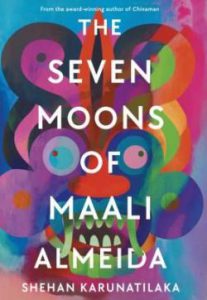 Maali Almeida, war photographer, gambler and closet gay, has woken up dead in what seems to be a celestial visa office. His dismembered body is sinking in the Beira Lake and he has no idea who killed him. At a time when scores are settled by death squads, suicide bombers and hired goons, the list of suspects is depressingly long.
Maali Almeida, war photographer, gambler and closet gay, has woken up dead in what seems to be a celestial visa office. His dismembered body is sinking in the Beira Lake and he has no idea who killed him. At a time when scores are settled by death squads, suicide bombers and hired goons, the list of suspects is depressingly long.
But even in the afterlife, time is running out for Maali. He has ‘seven moons’ to try and contact the man and woman he loves most and lead them to a hidden cache of photos that will rock Sri Lanka.
“Life after death in Sri Lanka: an afterlife noir, with nods to Dante and Buddha and yet unpretentious. Fizzes with energy, imagery and ideas against a broad, surreal vision of the Sri Lankan civil wars. Slyly, angrily comic.”
— The 2022 judges Booker Prize on The Seven Moons of Maali Almeida
• fleursdumal.nl magazine
More in: - Book News, - Bookstores, Archive K-L, Awards & Prizes
Anything the Landlord Touches was Emma Lew’s second collection to be published in Australia.
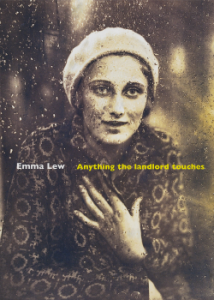 The book won the C.J. Dennis Prize for Poetry (the Victorian State Premier’s award for poetry), and the Judith Wright Calanthe Award (the Queensland Premier’s Prize for Poetry), two of the main literary prizes in the country, and was also short-listed for The Age award and the NSW and South Australian Premier’s Literary Prizes.
The book won the C.J. Dennis Prize for Poetry (the Victorian State Premier’s award for poetry), and the Judith Wright Calanthe Award (the Queensland Premier’s Prize for Poetry), two of the main literary prizes in the country, and was also short-listed for The Age award and the NSW and South Australian Premier’s Literary Prizes.
Emma Lew lives in Melbourne. Her first collection of poems, The Wild Reply (1997), won the Mary Gilmore Award and was joint winner of the Age Poetry Book of the Year Award. Her second collection, Anything the Landlord Touches (2002), won the Victorian Premier’s C. J. Dennis Prize for Poetry and the Queensland Premier’s Judith Wright Calanthe Prize for Poetry. A selection of German language translations of her poems by Mirko Bonne was published under the title Nesselgesang in 2008. Crow College: New and Selected Poems was published by Giramondo in 2019.
Anything the Landlord Touches
by Emma Lew
Poetry
Giramondo Publishing Australia
96 pages
Paperback
21 x 15 cm
2002
ISBN 0957831161
$22.00
• fleursdumal.nl magazine
More in: #Editors Choice Archiv, - Book News, - Bookstores, Archive K-L, Archive K-L
No art has been denounced as often as poetry. It’s even bemoaned by poets: “I, too, dislike it,” wrote Marianne Moore.
“Many more people agree they hate poetry,” Ben Lerner writes, “than can agree what poetry is. I, too, dislike it and have largely organized my life around it and do not experience that as a contradiction because poetry and the hatred of poetry are inextricable in ways it is my purpose to explore.”
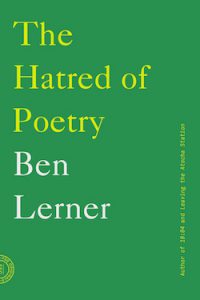 In this inventive and lucid essay, Lerner takes the hatred of poetry as the starting point of his defense of the art. He examines poetry’s greatest haters (beginning with Plato‘s famous claim that an ideal city had no place for poets, who would only corrupt and mislead the young) and both its greatest and worst practitioners, providing inspired close readings of Keats, Dickinson, McGonagall, Whitman, and others.
In this inventive and lucid essay, Lerner takes the hatred of poetry as the starting point of his defense of the art. He examines poetry’s greatest haters (beginning with Plato‘s famous claim that an ideal city had no place for poets, who would only corrupt and mislead the young) and both its greatest and worst practitioners, providing inspired close readings of Keats, Dickinson, McGonagall, Whitman, and others.
Throughout, he attempts to explain the noble failure at the heart of every truly great and truly horrible poem: the impulse to launch the experience of an individual into a timeless communal existence. In The Hatred of Poetry, Lerner has crafted an entertaining, personal, and entirely original examination of a vocation no less essential for being impossible.
Ben Lerner was born in Topeka, Kansas, in 1979. He has received fellowships from the Fulbright, Guggenheim, Howard, and MacArthur Foundations. His first novel, Leaving the Atocha Station, won the 2012 Believer Book Award, and excerpts from 10:04 have been awarded The Paris Review’s Terry Southern Prize. He has published three poetry collections: The Lichtenberg Figures, Angle of Yaw (a finalist for the National Book Award for Poetry),and Mean Free Path. Lerner is a professor of English at Brooklyn College.
The Hatred of Poetry
by Ben Lerner
Publisher: FSG Originals
First Edition (June 7, 2016)
Language : English
Paperback
96 pages
ISBN-10 : 0865478201
ISBN-13 : 978-0865478206
$ 8.99
• fleursdumal.nl magazine
More in: #Editors Choice Archiv, #Modern Poetry Archive, - Book News, - Book Stories, Archive K-L, Archive K-L, LITERARY MAGAZINES
Deaf Republic opens in an occupied country in a time of political unrest. When soldiers breaking up a protest kill a deaf boy, Petya, the gunshot becomes the last thing the citizens hear—all have gone deaf, and their dissent becomes coordinated by sign language.
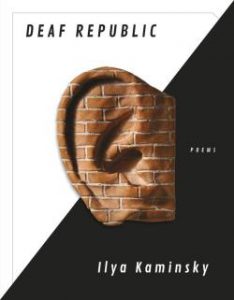 The story follows the private lives of townspeople encircled by public violence: a newly married couple, Alfonso and Sonya, expecting a child; the brash Momma Galya, instigating the insurgency from her puppet theater; and Galya’s girls, heroically teaching signs by day and by night luring soldiers one by one to their deaths behind the curtain.
The story follows the private lives of townspeople encircled by public violence: a newly married couple, Alfonso and Sonya, expecting a child; the brash Momma Galya, instigating the insurgency from her puppet theater; and Galya’s girls, heroically teaching signs by day and by night luring soldiers one by one to their deaths behind the curtain.
At once a love story, an elegy, and an urgent plea—Ilya Kaminsky’s long-awaited Deaf Republic confronts our time’s vicious atrocities and our collective silence in the face of them.
Ilya Kaminsky was born in the former Soviet Union and is now an American citizen. He is the author of a previous poetry collection, Dancing in Odessa, and coeditor of The Ecco Anthology of International Poetry. He has received a Whiting Award, a Lannan Literary Fellowship, and a Guggenheim Fellowship, and was named a finalist for the Neustadt International Prize for Literature. His work has been translated into more than twenty languages.
Deaf Republic
Poems
by Ilya Kaminsky
Publisher: Graywolf 2019
Language: English
Paperback: 96 pages
ISBN-10 : 1555978312
ISBN-13 : 978-1555978310
Paperback $10.79
• fleursdumal.nl magazine
More in: #Editors Choice Archiv, - Book Lovers, Archive K-L, Archive K-L
An astonishing collection about interconnectedness—between the human and nonhuman, ancestors and ourselves—from National Book Critics Circle Award winner, National Book Award finalist and U.S. Poet Laureate Ada Limón.
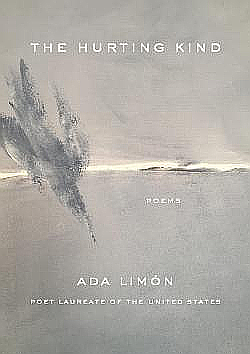 “I have always been too sensitive, a weeper / from a long line of weepers,” writes Limón.
“I have always been too sensitive, a weeper / from a long line of weepers,” writes Limón.
“I am the hurting kind.”
What does it mean to be the hurting kind?
To be sensitive not only to the world’s pain and joys, but to the meanings that bend in the scrim between the natural world and the human world?
To divine the relationships between us all?
To perceive ourselves in other beings—and to know that those beings are resolutely their own, that they “do not / care to be seen as symbols”?
With Limón’s remarkable ability to trace thought, The Hurting Kind explores those questions—incorporating others’ stories and ways of knowing, making surprising turns, and always reaching a place of startling insight.
These poems slip through the seasons, teeming with horses and kingfishers and the gleaming eyes of fish.
And they honor parents, stepparents, and grandparents: the sacrifices made, the separate lives lived, the tendernesses extended to a hurting child; the abundance, in retrospect, of having two families.
Along the way,we glimpse loss. There are flashes of the pandemic, ghosts whose presence manifests in unexpected memories and the mysterious behavior of pets left behind. But The Hurting Kind is filled, above all, with connection and the delight of being in the world.
“Slippery and waddle thieving my tomatoes still / green in the morning’s shade,” writes Limón of a groundhog in her garden, “she is doing what she can to survive.”
Ada Limón grew up in Glen Ellen and Sonoma, California. A graduate of New York University’s MFA Creative Writing Program, she has received fellowships from the Provincetown Fine Arts Work Center, the New York Foundation for the Arts, and won the Chicago Literary Award for Poetry. She is the author of three books of poetry, Lucky Wreck (Autumn House Press, 2006), This Big Fake World (Pearl Editions, 2007), and Sharks in the Rivers (Milkweed Editions, 2010). She is currently at work on a novel, a book of essays, and a new collection of poems. Ada Limón became the 24th Poet Laureate of the United States in July of 2022.
The Hurting Kind
by Ada Limón (Author)
Publisher: Milkweed Editions
May 10, 2022
Language: English
Hardcover: 120 pages
ISBN-10: 1639550496
ISBN-13: 978-1639550494
$17.99
• fleursdumal.nl magazine
More in: #Editors Choice Archiv, #Modern Poetry Archive, - Book News, Archive K-L, Archive K-L
Marina Keegan (1989-2012) was an award-winning author, journalist, playwright, poet, actress, and activist.
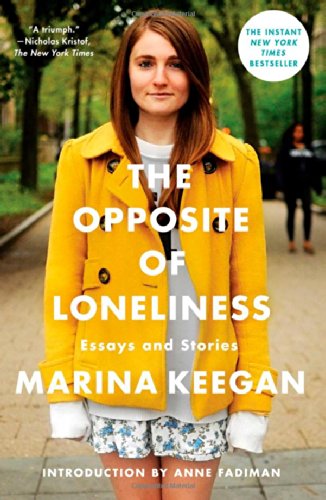
Her nonfiction has been published in The New York Times; her fiction has been published on NewYorker.com, and read on NPR’s Selected Shorts; her musical, Independents, was a New York Times Critics’ Pick. Marina’s final essay for The Yale Daily News, “The Opposite of Loneliness”, became an instant global sensation, viewed by more than 1.4 million people from 98 countries.
‘A generation-defining collection published posthumously…Her voice is relevant, sharp, fresh, unfiltered and poetic, with a dry wit. You can dive in and out of her questioning and her musings and meanderings. So much promise’, Jenna Coleman, star of Doctor Who and Victoria.
Marina Keegan’s star was on the rise when she graduated from Yale in May 2012. She had a play that was to be produced at the New York International Fringe Festival and a job waiting for her at the New Yorker. Tragically, five days after graduation, Marina died in a car crash.
As her family, friends and classmates, deep in grief, joined to create a memorial service for Marina, her unforgettable last essay for the Yale Daily News, ‘The Opposite of Loneliness’, went viral, receiving more than 1.4 million hits.
She had struck a chord. Even though she was just 22 when she died, Marina left behind a rich, expansive trove of prose that, like her title essay, captures the hope, uncertainty and possibility of her generation. The Opposite of Loneliness is an assemblage of Marina’s essays and stories that articulates the universal struggle we all face as we work out what we aspire to be and how we can harness our talents to make an impact on the world.
The Opposite of Loneliness:
Essays and Stories
by Marina Keegan (Author),
Anne Fadiman (Introduction)
Publisher: Scribner,
Simon & Schuster Ltd
First Edition (April 8, 2014)
Language: English
240 pages
ISBN-10 : 147675361X
ISBN-13 : 978-1476753614
Price: Paperback € 19,99
Marina Keegan (1989-2012)
American author, playwright, journalist, actress and poet
Born: Marina Evelyn Keegan
October 25, 1989
Boston, Massachusetts
Died: May 26, 2012 (aged 22)
Cape Cod (USA)
Alma mater; Yale University
The Opposite of Loneliness:
Essays and Stories (2014)
American literature
For more information, visit: TheOppositeofLoneliness.com
• fleursdumal.nl magazine
More in: #Biography Archives, #Editors Choice Archiv, - Book News, Archive K-L, Archive K-L, In Memoriam, Marina Keegan, THEATRE
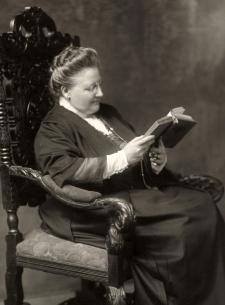
Lead Soldiers
The nursery fire burns brightly, crackling in cheerful
little explosions
and trails of sparks up the back of the chimney. Miniature
rockets
peppering the black bricks with golden stars, as though a gala
flamed a night of victorious wars.
The nodding mandarin on the bookcase moves his
head forward and back, slowly,
and looks into the air with his blue-green eyes. He stares
into the air
and nods — forward and back. The red rose in his hand
is a crimson splash
on his yellow coat. Forward and back, and his blue-green
eyes stare
into the air, and he nods — nods.
Tommy’s soldiers march to battle,
Trumpets flare and snare-drums rattle.
Bayonets flash, and sabres glance —
How the horses snort and prance!
Cannon drawn up in a line
Glitter in the dizzy shine
Of the morning sunlight. Flags
Ripple colours in great jags.
Red blows out, then blue, then green,
Then all three — a weaving sheen
Of prismed patriotism. March
Tommy’s soldiers, stiff and starch,
Boldly stepping to the rattle
Of the drums, they go to battle.
Tommy lies on his stomach on the floor and directs his columns.
He puts his infantry in front, and before them ambles a mounted
band.
Their instruments make a strand of gold before the scarlet-tunicked
soldiers,
and they take very long steps on their little green platforms,
and from the ranks bursts the song of Tommy’s soldiers marching
to battle.
The song jolts a little as the green platforms stick on the thick
carpet.
Tommy wheels his guns round the edge of a box of blocks, and places
a squad of cavalry on the commanding eminence of a footstool.
The fire snaps pleasantly, and the old Chinaman nods — nods. The
fire makes
the red rose in his hand glow and twist. Hist! That
is a bold song
Tommy’s soldiers sing as they march along to battle.
Crack! Rattle! The sparks
fly up the chimney.
Tommy’s army’s off to war —
Not a soldier knows what for.
But he knows about his rifle,
How to shoot it, and a trifle
Of the proper thing to do
When it’s he who is shot through.
Like a cleverly trained flea,
He can follow instantly
Orders, and some quick commands
Really make severe demands
On a mind that’s none too rapid,
Leaden brains tend to the vapid.
But how beautifully dressed
Is this army! How impressed
Tommy is when at his heel
All his baggage wagons wheel
About the patterned carpet, and
Moving up his heavy guns
He sees them glow with diamond suns
Flashing all along each barrel.
And the gold and blue apparel
Of his gunners is a joy.
Tommy is a lucky boy.
Boom! Boom! Ta-ra!
The old mandarin nods under his purple umbrella. The
rose in his hand
shoots its petals up in thin quills of crimson. Then
they collapse
and shrivel like red embers. The fire sizzles.
Tommy is galloping his cavalry, two by two, over the floor. They
must pass
the open terror of the door and gain the enemy encamped under the
wash-stand.
The mounted band is very grand, playing allegro and leading the
infantry on
at the double quick. The tassel of the hearth-rug has
flung down
the bass-drum, and he and his dapple-grey horse lie overtripped,
slipped out of line, with the little lead drumsticks glistening
to the fire’s shine.
The fire burns and crackles, and tickles the tripped
bass-drum
with its sparkles.
The marching army hitches its little green platforms
valiantly, and steadily
approaches the door. The overturned bass-drummer, lying
on the hearth-rug,
melting in the heat, softens and sheds tears. The song
jeers
at his impotence, and flaunts the glory of the martial and still
upstanding,
vaunting the deeds it will do. For are not Tommy’s soldiers
all bright and new?
Tommy’s leaden soldiers we,
Glittering with efficiency.
Not a button’s out of place,
Tons and tons of golden lace
Wind about our officers.
Every manly bosom stirs
At the thought of killing — killing!
Tommy’s dearest wish fulfilling.
We are gaudy, savage, strong,
And our loins so ripe we long
First to kill, then procreate,
Doubling so the laws of Fate.
On their women we have sworn
To graft our sons. And overborne
They’ll rear us younger soldiers, so
Shall our race endure and grow,
Waxing greater in the wombs
Borrowed of them, while damp tombs
Rot their men. O Glorious War!
Goad us with your points, Great Star!
The china mandarin on the bookcase nods slowly, forward and back—
forward and back — and the red rose writhes and wriggles,
thrusting its flaming petals under and over one another like tortured
snakes.
The fire strokes them with its dartles, and purrs at them,
and the old man nods.
Tommy does not hear the song. He only sees the beautiful,
new,
gaily-coloured lead soldiers. They belong to him, and
he is very proud
and happy. He shouts his orders aloud, and gallops his
cavalry past the door
to the wash-stand. He creeps over the floor on his hands
and knees
to one battalion and another, but he sees only the bright colours
of his soldiers and the beautiful precision of their gestures.
He is a lucky boy to have such fine lead soldiers to enjoy.
Tommy catches his toe in the leg of the wash-stand, and jars the
pitcher.
He snatches at it with his hands, but it is too late. The
pitcher falls,
and as it goes, he sees the white water flow over its lip. It
slips
between his fingers and crashes to the floor. But it
is not water which oozes
to the door. The stain is glutinous and dark, a spark
from the firelight
heads it to red. In and out, between the fine, new soldiers,
licking over the carpet, squirms the stream of blood, lapping at
the little green platforms, and flapping itself against the painted
uniforms.
The nodding mandarin moves his head slowly, forward and back.
The rose is broken, and where it fell is black blood. The
old mandarin leers
under his purple umbrella, and nods — forward and back, staring
into the air
with blue-green eyes. Every time his head comes forward
a rosebud pushes
between his lips, rushes into full bloom, and drips to the ground
with a splashing sound. The pool of black blood grows
and grows,
with each dropped rose, and spreads out to join the stream from
the wash-stand. The beautiful army of lead soldiers steps
boldly forward,
but the little green platforms are covered in the rising stream
of blood.
The nursery fire burns brightly and flings fan-bursts of stars up
the chimney,
as though a gala flamed a night of victorious wars.
Amy Lowell
(1874 – 1925)
Lead Soldiers
Poem
• fleursdumal.nl magazine
More in: Archive K-L, Archive K-L, Lowell, Amy
A landmark collection of poetry by acclaimed fiction writer, translator, and MacArthur Fellow John Keene, PUNKS: NEW & SELECTED POEMS is a generous treasury in seven sections that spans decades and includes previously unpublished and brand new work.
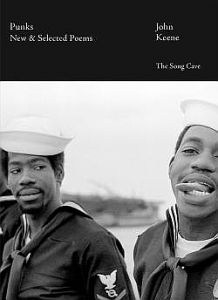 With depth and breadth, PUNKS weaves together historic narratives of loss, lust, and love. The many voices that emerge in these poems—from historic Black personalities, both familial and famous, to the poet’s friends and lovers in gay bars and bedrooms—form a cast of characters capable of addressing desire, oppression, AIDS, and grief through sorrowful songs that “we sing as hard as we live.”
With depth and breadth, PUNKS weaves together historic narratives of loss, lust, and love. The many voices that emerge in these poems—from historic Black personalities, both familial and famous, to the poet’s friends and lovers in gay bars and bedrooms—form a cast of characters capable of addressing desire, oppression, AIDS, and grief through sorrowful songs that “we sing as hard as we live.”
At home in countless poetic forms, PUNKS reconfirms John Keene as one of the most important voices in contemporary poetry.
John Keene is a writer, translator, professor, and artist who was named a MacArthur Fellow in 2018. In 1989, Keene joined the Dark Room Writers Collective, and is a Graduate Fellow of the Cave Canem Writers Workshops. He is the author of Annotations, and Counternarratives, both published by New Directions, as well as several other works, including the poetry collection Seismosis, with artist Christopher Stackhouse, and a translation of Brazilian author Hilda Hilst’s novel Letters from a Seducer. Keene is the recipient of many awards and fellowships—including the Windham-Campbell Prize, the Whiting Foundation Prize, the Republic of Consciousness Prize, and the American Book Award. He teaches at Rutgers University-Newark.
# new poetry
Punks: New & Selected Poems
John Keene
Pub Date:12/1/2021
Publisher: The Song Cave
ISBN: 978-1-73727-752-1
Binding: Paperback
Pages:234
Price: $ 20.00
• fleursdumal.nl magazine
More in: # Punk poetry, #Editors Choice Archiv, - Book News, Archive K-L, Archive K-L
Op 12 maart 2022 was het honderd jaar geleden dat Jack Kerouac werd geboren. Op die dag verscheen het nog niet eerder in het Nederlands vertaalde Eenzame reiziger, waarin Kerouac in ‘jazzy impressionistisch proza’ (The New Yorker) verslag doet van zijn omzwervingen door de VS, Mexico, Marokko, Londen en Parijs.
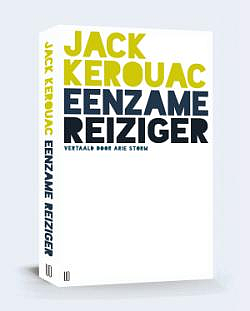 Eenzame reiziger (voor het eerst gepubliceerd in 1960) is een tijdloos reisverslag en een jubelende viering van de menselijke ontdekkingsdrang. Terwijl hij door de VS, Mexico, Marokko, Parijs en Londen zwerft, legt Kerouac in poëtisch proza het leven onderweg vast.
Eenzame reiziger (voor het eerst gepubliceerd in 1960) is een tijdloos reisverslag en een jubelende viering van de menselijke ontdekkingsdrang. Terwijl hij door de VS, Mexico, Marokko, Parijs en Londen zwerft, legt Kerouac in poëtisch proza het leven onderweg vast.
Staande op de locomotief van een trein die langs velden met stekelige cactussen raast; zijn eerste stierengevecht in Mexico terwijl hij high is van opium; bijpraten met de jongeren van het beat-nachtleven in New York; zichzelf begraven in de met sneeuw bedekte bergen van Noordwest-Amerika; mediteren op een zonovergoten dak in Tanger; of verliefd worden op Montmartre en de prachtige basilique du Sacré-Cœur – Kerouac schrijft zowel over de eindeloze diversiteit van het menselijk leven als over zijn eigen levenslustige filosofie van zelfontplooiing.
Jack Kerouac (1922-1969), geboren in Massachusetts, studeerde aan de Columbia Universiteit in New York, waar hij een aantal van de schrijvers ontmoette die later deel zouden uitmaken van de Beat Generation, onder wie Allen Ginsberg en William Burroughs. In 1957 werd On The Road gepubliceerd. Ongelukkig door het succes en alle aandacht trok hij zich terug in zijn geboorteplaats, waar hij op zevenenveertigjarige leeftijd stierf aan de gevolgen van een leverbloeding.
Eenzame reiziger
Auteur: Jack Kerouac
Vertaald door Arie Storm
Taal: Nederlands
Verschijningsdatum maart 2022
Druk 1
Afmeting: 20,1 x 12,6 x 2,6 cm
Bindwijze Paperback
280 pagina’s
Illustraties: Nee
EAN 9789492068828
NUR 320
Uitgeverij Oevers
€22,50
• fleursdumal.nl magazine
More in: #Beat Generation Archives, - Book News, Archive K-L, Burroughs, William S., Ginsberg, Allen, Kerouac, Jack
Franz Kafka (1883-1924) groeide op in Praag, waar hij deel uitmaakte van de Duitstalige Joodse gemeenschap en aan de rand van het getto woonde.
Hij bezocht het Duitse gymnasium en studeerde aan de universiteit van Praag. Daar ontmoette hij Max Brod, zijn vriend en latere biograaf.
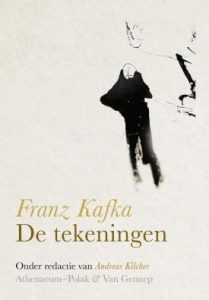 Vanaf 1908 tot 1917 werkte hij als ambtenaar bij een bedrijf dat arbeidsongevallenverzekeringen verzorgde, een baan die hij als een noodzakelijk kwaad beschouwde om zich aan het schrijven te kunnen wijden. Zijn longtuberculose, die hem in 1924 fataal zou worden, deed zich in deze tijd gelden. Gedurende zijn leven had hij enkele korte maar intense relaties, waaronder drie verlovingen, zo blijkt uit enkele postuum uitgegeven brieven. De dames waar hij mee omging komen ook indirect terug in zijn werk. Hij leidde een teruggetrokken leven, maar discussieerde veel binnen de Praagse culturele elite, mede via zijn ‘ontdekker’ Brod.
Vanaf 1908 tot 1917 werkte hij als ambtenaar bij een bedrijf dat arbeidsongevallenverzekeringen verzorgde, een baan die hij als een noodzakelijk kwaad beschouwde om zich aan het schrijven te kunnen wijden. Zijn longtuberculose, die hem in 1924 fataal zou worden, deed zich in deze tijd gelden. Gedurende zijn leven had hij enkele korte maar intense relaties, waaronder drie verlovingen, zo blijkt uit enkele postuum uitgegeven brieven. De dames waar hij mee omging komen ook indirect terug in zijn werk. Hij leidde een teruggetrokken leven, maar discussieerde veel binnen de Praagse culturele elite, mede via zijn ‘ontdekker’ Brod.
Een reconstructie van Kafka’s leven en denken is mogelijk geworden door zijn nalatenschap in de vorm van dagboeken, die hij van 1910 tot 1923 bijhield. Kafka schreef voornamelijk proza, waarvan zijn romans Der Prozess (1925), Das Schloss (1926) en Amerika (1927) de bekendste zijn. Enkele prozavertellingen als Die Verwandlung (1915), Das Urteil (1913) en In der Strafkolonie (1919) hebben later ook hun weg naar het grote publiek gevonden.
Wat Kafka’s werk typeert zijn tegenstellingen als weten en onwetendheid, macht en machteloosheid, loyaliteit en verraad, menselijkheid en verontmenselijking. Hij schetst labyrinten waarin individuen wanhopig naar een uitweg zoeken. De werelden die hij creëert zijn absurd, kennen een heel eigen logica en worden in een droge, zakelijke stijl beschreven. Veel van zijn werk is tijdens zijn leven onvoltooid gebleven, waardoor veel discussie mogelijk is over de bedoelingen van de schrijver. Pas in de jaren dertig van de twintigste eeuw groeide de belangstelling voor zijn werk, dat mede dankzij Max Brod postuum verscheen.
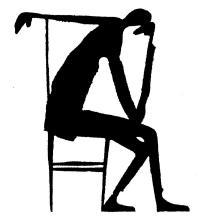 In 2019 werd het Max Brod Archief in de Nationale Bibliotheek van Israël geopend. Tussen de opvallende archiefstukken bevonden zich tot dusver onbekende tekeningen die Franz Kafka maakte in de jaren 1901-1906. Hij tekende, al voor de ontwikkeling van zijn literaire talent, om zich artistiek uit te drukken.
In 2019 werd het Max Brod Archief in de Nationale Bibliotheek van Israël geopend. Tussen de opvallende archiefstukken bevonden zich tot dusver onbekende tekeningen die Franz Kafka maakte in de jaren 1901-1906. Hij tekende, al voor de ontwikkeling van zijn literaire talent, om zich artistiek uit te drukken.
Aan zijn verloofde Felice Bauer schreef hij in 1913: ‘Weet je, ik was ooit een groot tekenaar, maar toen ben ik bij een slechte schilderes schoolse tekenlessen gaan nemen en heb ik mijn hele talent verknoeid. Stel je dat eens voor! […] In die tekeningen heb ik indertijd, het is nu al jaren geleden, meer bevrediging gevonden dan in enige andere bezigheid.’
In Franz Kafka. De tekeningen worden voor het eerst meer dan 200 tekeningen, waarvan 140 nooit eerder zijn gepubliceerd, in een luxe kunstuitgave samengebracht. Deze is samengesteld en van begeleidende essays en een verantwoording voorzien door Andreas Kilcher, Pavel Schmidt en Judith Butler.
Franz Kafka. De tekeningen
Auteur: Franz Kafka
Taal: Nederlands
Vertaald door Willem van Toorn
Uitgever Athenaeum
Hardcover
EAN 9789025313609
1 oktober 2021
336 pagina’s
Illustraties
49,90
# new books
Franz Kafka.
De tekeningen
• fleursdumal.nl magazine
More in: - Book News, - Bookstores, Archive K-L, Archive K-L, Art & Literature News, Franz Kafka, Illustrators, Illustration, Kafka, Franz, Kafka, Franz
A revelatory new portrait of the courageous woman who saved Dostoyevsky’s life—and became a pioneer in Russian literary history
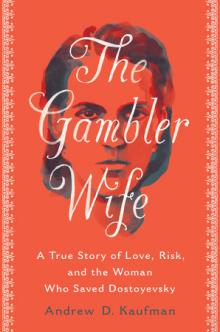 In the fall of 1866, a twenty-year-old stenographer named Anna Snitkina applied for a position with a writer she idolized: Fyodor Dostoyevsky. A self-described “emancipated girl of the sixties,” Snitkina had come of age during Russia’s first feminist movement, and Dostoyevsky—a notorious radical turned acclaimed novelist—had impressed the young woman with his enlightened and visionary fiction.
In the fall of 1866, a twenty-year-old stenographer named Anna Snitkina applied for a position with a writer she idolized: Fyodor Dostoyevsky. A self-described “emancipated girl of the sixties,” Snitkina had come of age during Russia’s first feminist movement, and Dostoyevsky—a notorious radical turned acclaimed novelist—had impressed the young woman with his enlightened and visionary fiction.
Yet in person she found the writer “terribly unhappy, broken, tormented,” weakened by epilepsy, and yoked to a ruinous gambling addiction. Alarmed by his condition, Anna became his trusted first reader and confidante, then his wife, and finally his business manager—launching one of literature’s most turbulent and fascinating marriages.
The Gambler Wife offers a fresh and captivating portrait of Anna Dostoyevskaya, who reversed the novelist’s freefall and cleared the way for two of the most notable careers in Russian letters—her husband’s and her own. Drawing on diaries, letters, and other little-known archival sources, Andrew Kaufman reveals how Anna warded off creditors, family members, and her greatest romantic rival, keeping the young family afloat through years of penury and exile.
In a series of dramatic set pieces, we watch as she navigates the writer’s self-destructive binges in the casinos of Europe—even hazarding an audacious turn at roulette herself—until his addiction is conquered. And, finally, we watch as Anna frees her husband from predatory contracts by founding her own publishing house, making Anna the first solo female publisher in Russian history.
The result is a story that challenges ideas of empowerment, sacrifice, and female agency in nineteenth-century Russia—and a welcome new appraisal of an indomitable woman whose legacy has been nearly lost to literary history.
Andrew D. Kaufman is an associate professor, General Faculty, lecturer in Slavic Languages and Literatures, and assistant director of the Center for Teaching Excellence at the University of Virginia. A PhD in Slavic languages and literatures from Stanford University, Kaufman is the author of Give War and Peace a Chance: Tolstoyan Wisdom for Troubled Times and Understanding Tolstoy, and a coauthor of Russian for Dummies. His work has been featured on Today, NPR, and PBS, and in The Washington Post, and he has served as a Russian literature expert for Oprah’s Book Club. Kaufman is the creator of Books Behind Bars, introducing incarcerated youth to the writings of Dostoyevsky and other authors.
The Gambler Wife:
A True Story of Love, Risk,
and the Woman Who Saved Dostoyevsky
by Andrew D. Kaufman
Publisher: Penguin Publishing Group
Publication date: 08/31/2021
Hardcover
Pages: 400
ISBN-13: 9780525537144
$30.00
• fleursdumal.nl magazine
More in: #Biography Archives, - Book News, - Book Stories, Archive K-L, Art & Literature News, The Ideal Woman
Thank you for reading Fleurs du Mal - magazine for art & literature